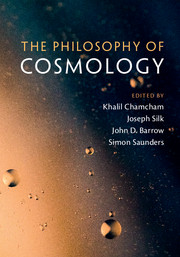Book contents
- Frontmatter
- Contents
- List of Contributors
- Preface
- Acknowledgments
- Part I Issues in the Philosophy of Cosmology
- Part II Structures in the Universe and the Structure of Modern Cosmology
- Part III Foundations of Cosmology: Gravity and the Quantum
- Part IV Quantum Foundations and Quantum Gravity
- Part V Methodological and Philosophical Issues
- 19 Limits of Time in Cosmology
- 20 Self-Locating Priors and Cosmological Measures
- 21 On Probability and Cosmology: Inference Beyond Data?
- 22 Testing the Multiverse: Bayes, Fine-Tuning and Typicality
- 23 A New Perspective on Einstein's Philosophy of Cosmology
- 24 The Nature of the Past Hypothesis
- 25 Big and Small
- Index
- References
19 - Limits of Time in Cosmology
from Part V - Methodological and Philosophical Issues
Published online by Cambridge University Press: 18 April 2017
- Frontmatter
- Contents
- List of Contributors
- Preface
- Acknowledgments
- Part I Issues in the Philosophy of Cosmology
- Part II Structures in the Universe and the Structure of Modern Cosmology
- Part III Foundations of Cosmology: Gravity and the Quantum
- Part IV Quantum Foundations and Quantum Gravity
- Part V Methodological and Philosophical Issues
- 19 Limits of Time in Cosmology
- 20 Self-Locating Priors and Cosmological Measures
- 21 On Probability and Cosmology: Inference Beyond Data?
- 22 Testing the Multiverse: Bayes, Fine-Tuning and Typicality
- 23 A New Perspective on Einstein's Philosophy of Cosmology
- 24 The Nature of the Past Hypothesis
- 25 Big and Small
- Index
- References
- Type
- Chapter
- Information
- The Philosophy of Cosmology , pp. 377 - 395Publisher: Cambridge University PressPrint publication year: 2017
References
- 1
- Cited by



